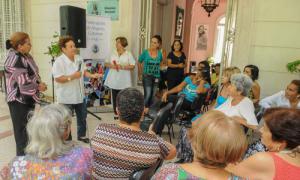 Memories and emotions regarding the creation of the Federation of Cuban Women (FMC) and the work undertaken by its founders – without forgetting the most important moments of an organization which in a few days will celebrate its 56th anniversary – were shared during an afternoon gathering of members on August 16, in the FMC’s national headquarters.
Memories and emotions regarding the creation of the Federation of Cuban Women (FMC) and the work undertaken by its founders – without forgetting the most important moments of an organization which in a few days will celebrate its 56th anniversary – were shared during an afternoon gathering of members on August 16, in the FMC’s national headquarters.
”Cuban women’s incorporation in the country’s workforce and public sphere since the early years of the Revolution, their insertion into complex spaces such as sugar mills, the personal development and advancement of campesinas; training and emergence of female professionals across all sectors of society have been important achievements in which our organization has played an active role,” highlighted Mercedes Albuquerque, FMC founder.
A review of the formative days of the Federation included an analysis of the process of integrating the various women’s organizations which existed at the triumph of the Revolution, recognition of the contribution of the People’s Socialist Party to the founding of the FMC, the importance of the integrationist and unitary ideals of the Comandante en Jefe Fidel Castro and the exemplary leadership of Vilma Espín.
Meanwhile, Teresa Amerelle Boué, a member of the Party Political Bureau and secretary general of the FMC, reflected on the socio-political context which characterized the early stages of the Revolution, when the call was made to think about the future of Cuban women from an organization uniting efforts and voices in support of the new society which was being built.
Participants, all women of passion and great sacrifice, recognized that they compose part of a humanist project – “a Revolution within the Revolution” –built on solid foundations with the participation of many who are no longer with us today.
In this sense, Brigade General Delsa Esther Puebla stressed the importance of the continuation of the FMC, its new efforts, its redefinition from the grassroots level, communities and the organization’s raison d’être: the family.
(Granma)